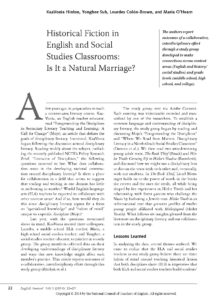Author: KaaVonia Hinton, Yonghee Suh, Lourdes Colón-Brown, and Maria O’Hearn
Summary: What happens when history and ELA teachers form a study group to develop understandings of disciplinary literacy and ways this new knowledge might affect each person’s practice? As members read and reflected together on historical fiction and nonfiction, they found that reading texts from both disciplines helped to more fully contextualize a historical period and promote historical empathy. This piece could generate ideas for forming similar study groups and provide an opportunity for teachers to delve into questions and issues related to disciplinary literacy within a professional development forum.
Original Date of Publication: January 2014
Excerpt
We also found that when using historical fiction in their classrooms, teachers of both subject matters wish to promote another key habit of mind: historical empathy, which needs to be built upon contextualizing the historical period. In English, it has been suggested that young adult fiction ‘can offer a connection to alienated students, mirror the lives of young adults and provide a forum for adolescents to discuss what it means to come of age, including navigating difficult problems, accessing tools needed to become problem solvers, and fostering empathy’ (Bucher and Hinton 10; Stallworth). More specifically, historical details build empathy and help students understand why characters in historical novels make certain decisions, thus humanizing historical periods and events (Bucher and Hinton; Nawrot).
Related Resources
- Disciplinary, Content-Area Literacy: An Annotated Bibliography
- VoiceThread Ties Together Student Voices, Images, and Writing
Original Source: National Writing Project, https://www.nwp.org/cs/public/print/resource/4559
